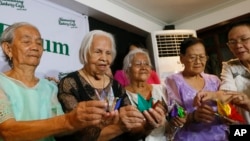Philippine women who said they were detained and used as sex slaves by the Japanese military during World War Two are demanding that President Benigno Aquino raise their plight during the state visit next week of Japan’s imperial couple.
For more than two decades the “lolas,” or grandmothers in Filipino, have been asking for three things from the Japanese government: a public apology, compensation from Japan’s government, and inclusion in Philippine history books.
At a news forum with several lolas in Manila, Lola Narcisa Claveria, 85, said it has been a long wait.
Seeking 'true justice'
“We still have not been given true justice because we women, we were innocent children. We lost so much. We lost our dignity. We were not able to study. And trauma is all we received at the hands of the Japanese soldiers," Claveria said.
Claveria was taken from her home and made a sex slave when she was about 13, said Richilda Extremadura, the head of Lila Pilipina, a women’s advocacy group representing the lolas.
Extremadura said Claveria’s father, a village leader in a northern province town, was skinned alive while her mother and sisters were raped and two other siblings were killed with bayonets.
Lila Pilipina estimates at least 1,000 Philippine nationals were victims of the Japanese military’s “comfort women” system.
In recent years, many of the remaining 200 lolas have died, leaving just 70.
Extremadura said only about eight are active in fighting for their cause.
In 1993, the Japanese government acknowledged the military carried out a system of prostitution. But it did not admit complicity in the system.
International estimates indicate the system used approximately 200,000 sex slaves.
Compensation fund
Japan’s government created a women’s compensation fund financed through private donations that some in the government felt was unnecessary.
The Philippines accepted the compensation.
Extremadura said while Japan and South Korea reached an agreement in December on more than $8 million in compensation through a non-government entity for the scores of thousands of South Korean victims, the women are not to speak of what happened to them.
She said if the Philippines and Japan were to ever reach this stage over the comfort woman issue, she hoped Aquino would speak to each survivor.
"Hopefully, Aquino will remember that he has a mother, he has grandmothers, and he must represent the cause of the Filipino comfort women to Emperor Akihito because Emperor Akihito, although he is not involved in the policies of his country … he is a very influential man.”
Last week, Aquino said at a news briefing reparations had already been made by Japan decades ago. But he said he would likely bring up the subject of trying to get additional help for the women during the imperial visit next week.
Philippine Congresswoman Emmi de Jesus said she introduced a resolution this week ahead of the visit, seeking the Philippine government’s position on this comfort women issue.
Emperor Akihito and Empress Michiko will be in the Philippines January 26-30.




